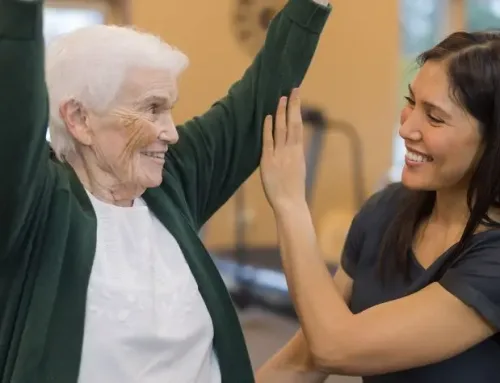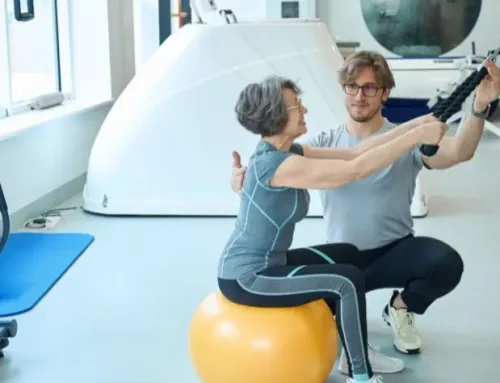Doctor of Occupational Therapy Requirements: What You Need to Apply

As the field of occupational therapy grows and more professionals choose the doctoral path, understanding the admission requirements is the first step toward advancing your career. Whether you’re an Occupational Therapy Assistant (OTA) ready to take the next step or a healthcare professional exploring a new direction, or someone looking to transition into occupational therapy, knowing what it takes to craft a successful application can help you move forward with confidence.
At Southern California University of Health Sciences (SCU) California Campus, our ACOTE-accredited OTD program is designed to make this process accessible. With a hybrid learning model that combines live and interactive coursework with hands-on, in-person intensives, SCU prepares students not only for leadership, research, and clinical excellence, but also for real-world practice through active learning—not pre-recorded lectures.
OTD Admissions: Do You Meet the Requirements?
Applying to an OTD program is a big step, and understanding the admission requirements can help you feel more prepared. While many programs focus heavily on your GPA and academic record, they also look for a mix of relevant experience and personal qualities that show your readiness for the field.
Whether you’re coming from a health sciences background, working as an OTA, or making a career switch, knowing what schools expect can set you up for success.
Educational Prerequisites
Most OTD programs require a bachelor’s degree in a relevant field (e.g., health sciences, kinesiology, psychology).
At SCU, we allow entry with 90+ college credits, making it a great option for students who haven’t yet completed a degree.
Recommended prerequisite coursework often includes:
- Anatomy & Physiology
- Psychology & Behavioral Sciences
- Medical Terminology
- Statistics or Research Methods
If you’re missing a required course or want to strengthen your GPA, SCU offers Accelerated Science courses that can be completed in as little as five weeks and are guaranteed to fulfill program prerequisites.
Additional Application Factors
Minimum GPA Requirements
Most programs require at least a 3.0 GPA, though some prefer a 3.5 or higher. At SCU, we require a cumulative GPA of 3.0 or above, but applications from students with a lower GPA are reviewed case by case. Strong experience, recommendation letters, and a compelling personal statement can help balance a lower GPA.
Interview Performance
While grades and experience matter, your interview can be just as important in the admissions process. Most programs use interviews to assess your communication skills, professionalism, and motivation for entering the field of occupational therapy.
At SCU, the interview is your opportunity to go beyond your application—to share your story, show your passion, and demonstrate that you’re ready to thrive in a hands-on, collaborative learning environment. Strong interview performance can help strengthen your application, especially if your academic record or experience is less competitive.
Observation Hours or Work Experience
Some schools require 20–100+ hours of volunteer or paid experience in an OT setting, such as: hospitals, rehabilitation centers, schools, or outpatient clinics. Many programs waive this requirement for licensed OTAs and applicants with relevant healthcare experience.
Letters of Recommendation
Most OTD programs require two to three letters of recommendation from individuals who can speak to your qualifications and potential in the field. These often include a licensed occupational therapist if you’ve completed observation hours, a professor or academic advisor, or a supervisor in a healthcare-related setting.
Personal Statement
This is your opportunity to showcase your passion for OT and explain:
- Why you’re pursuing occupational therapy
- Your career goals and how an OTD will help you reach them
- Relevant experience or skills that make you a strong candidate
GRE Requirements
Some OTD programs require the Graduate Record Examination (GRE), but many have dropped this requirement. At SCU, we do not require the GRE, making the application process more accessible to students.
Want to Get into an OTD Program? Here’s How to Strengthen Your Application
Getting into an OTD program takes more than meeting the basic admission requirements. Schools are looking for applicants who not only have the right academic background but also demonstrate a deep understanding of occupational therapy and a strong commitment to the field.
At SCU, we want to see applicants who are passionate, driven, and ready to excel in a doctoral-level OT program! Here’s how you can take your application to the next level and make a lasting impression on admissions committees.
1. Gain Hands-On Experience in the OT Field
Even if observation hours aren’t required, real-world experience can set your application apart. Volunteering, working, or shadowing in multiple OT settings—such as hospitals, outpatient clinics, schools, or rehabilitation centers—demonstrates your dedication and understanding of the field. Admissions committees appreciate applicants who go beyond the basics to gain meaningful, hands-on exposure to OT practice.
2. Craft a Standout Personal Statement
Your personal statement is your chance to showcase your passion for OT and explain why you’re the right fit for an OTD program. Be specific about your personal experiences, career goals, and why OT speaks to you. Avoid generic phrases and instead focus on meaningful moments that led you to pursue this path. Connecting your past education, work, and volunteer experiences to your future as an OT can make your application more compelling and authentic.
3. Secure Strong Letters of Recommendation
A great letter of recommendation goes beyond generic praise—it should highlight your work ethic, passion for OT, and ability to thrive in a doctoral program. Choose recommenders who know you well, such as professors, supervisors, or occupational therapists you’ve worked with. Ask for letters at least one to two months before the application deadline to give your references enough time to write thoughtful, detailed recommendations.
The Biggest Mistakes OTD Applicants Make (and How to Fix Them)
Applying to an OTD program is a big step, and while schools are eager to find dedicated, passionate students, some applicants miss out on their chance by making avoidable mistakes. From incomplete applications to weak personal statements, even small missteps can hurt your chances of getting in.
1. Not Meeting the Prerequisite Coursework or Credit Requirements
Some applicants assume any bachelor’s degree or college coursework qualifies them for an OTD program, only to realize too late that they’re missing essential classes. Programs often require anatomy, psychology, and physiology—courses that may not be covered in unrelated degrees. If you’re unsure, check each school’s specific requirements and, if needed, complete missing coursework before applying. At SCU, we also offer Accelerated Science courses so you can quickly meet requirements in as little as five weeks.
2. Submitting a Weak or Generic Personal Statement
A personal statement is your chance to stand out from the crowd. A vague or uninspired essay won’t cut it. Instead of generic phrases about wanting to help people, focus on:
- Specific experiences that led you to OT
- Challenges you’ve overcome that shaped your journey
- Your long-term career goals and why an OTD is the right fit
Schools want to see why OT is the right field for you and what makes you a strong candidate. Proofread carefully, and ask a mentor or professor to review your essay before submitting.
3. Choosing the Wrong People for Letters of Recommendation
Not all recommendation letters hold the same weight. A strong letter from a licensed OT, professor in a relevant field, or healthcare supervisor will carry far more impact than one from a friend or an employer in an unrelated industry. Choose recommenders who know you well and can speak to your work ethic, skills, and potential. Give them at least a month’s notice and provide them with background information to help them craft a compelling letter.
4. Ignoring GPA & Test Score Expectations
Some applicants assume a low GPA or missing GRE scores won’t matter, but many programs have strict minimums. If your GPA is below the required threshold, strengthen other areas of your application—like work experience, leadership roles, and a well-written personal statement.
5. Missing Deadlines or Submitting an Incomplete Application
Waiting until the last minute to gather materials is a recipe for disaster. OTD programs have firm deadlines, and missing even one document could delay or disqualify your application. Create a timeline with key deadlines for each school and double-check that transcripts, recommendation letters, and fees are submitted on time.
A Program Designed for You: SCU’s OTD
Earning a Doctor of Occupational Therapy (OTD) shouldn’t feel like an uphill battle before you even begin. At SCU, we’ve built a program that removes unnecessary roadblocks so you can focus on what matters—your education and future career. Whether it’s eliminating standardized testing, offering a blended learning format, or providing cutting-edge training tools, we’ve designed our OTD program to be as accessible and student-friendly as possible.
A Smarter, More Flexible Format
Our online-blended format is built for working professionals and busy students.
- 80% Online – Participate in live, synchronous classes led by expert faculty, giving you the flexibility of remote learning without sacrificing real-time engagement.
- Four In-Person Sessions Per Year – Hands-on training without the burnout of weekly campus visits.
- Designed for Balance – Learn from anywhere while still getting critical, real-world experience.
Graduate With Additional Qualifications That Set You Apart
SCU’s Doctor of Occupational Therapy program goes beyond academic excellence by providing specialized training that expands your professional qualifications. These built-in credentials give you added value in the job market and equip you to serve clients in more advanced ways from the very start of your career.
Physical Agent Modalities (PAM) Certification Preparation
You will complete Physical Agent Modalities (PAM) coursework that meets California’s certification requirements. This advanced training prepares you to apply specialized therapeutic techniques, including electrical stimulation, ultrasound, and thermal modalities—skills that enhance your ability to treat a wide range of client needs.
Lifestyle Medicine Certification Eligibility
You will also complete SCU’s Wellness & Lifestyle Health course, which fulfills the 10-hour conference requirement for the American College of Lifestyle Medicine (ACLM) Certification Exam. This additional qualification positions you to promote long-term health and well-being through lifestyle-based interventions, an increasingly valued approach in modern healthcare.
Expanded Career Readiness
With these additional credentials, you will graduate ready to make an immediate impact across diverse practice areas, including rehabilitation, mental health, telehealth, pediatrics, corporate wellness, and chronic disease management.
SCU’s OTD program prepares you to lead, innovate, and elevate care across the healthcare continuum.
Tech-Forward Learning
We embrace innovation to give students an edge in the field. Our curriculum includes:
- VR Therapy for immersive rehab training, including cutting-edge applications in trauma relief and patient-centered care.
- 3D Printing for Adaptive Equipment – Learn how to design and produce custom adaptive devices that improve daily living for your clients—giving you a creative edge in solving real-world challenges.
- Driving Simulators for Functional Assessments – Practice evaluating clients in a controlled, safe, and realistic driving environment, helping them regain independence while minimizing risk.
- Advanced Anatomy and Simulation Tools – Build deep clinical expertise with interactive anatomy platforms and virtual case simulations that strengthen your understanding of the human body and how to treat it holistically.
Tuition You Can Count On
We believe financial planning shouldn’t be a guessing game. That’s why we offer a Fixed Tuition Guarantee—what you pay on day one is what you’ll pay throughout the program. No unexpected increases, no surprises. Just straightforward, predictable costs so you can focus on your education, not your budget.
Join a Program That Works for You
At SCU, we’re redefining Doctor of Occupational Therapy requirements to make grad school more accessible, without sacrificing quality. No GRE. A flexible, blended format. Cutting-edge learning tools. A capstone project that sets you apart. Faculty at the forefront of Occupational Therapy in both theory and praxis. And with our Fixed Tuition Guarantee, no surprise costs along the way.
If you’re ready to take the next step toward a rewarding career in occupational therapy, it’s time to take a look at our admission requirements and apply today!
FAQs
Do I need to take the GRE to apply for an OTD program?
Not necessarily! Many programs, including ours, have dropped the GRE requirement. Schools are shifting focus to experience, passion, and academic performance rather than standardized test scores.
What are the typical Doctor of Occupational Therapy requirements for admission?
Most programs require a bachelor’s degree, prerequisite courses in subjects like anatomy and psychology, observation hours, letters of recommendation, and a personal statement. At SCU, a major part of our application process is the interview, which is your chance to share your passion, potential, and knowledge for the field directly with your future professors.
Can I work while completing an OTD program?
OTD programs are full-time and highly intensive, requiring a significant commitment to coursework, fieldwork, and hands-on training. Balancing a job alongside the program can be challenging, so it’s best to plan for full-time study.
What’s the job outlook for occupational therapists?
Strong! OT is a growing field, with increasing demand in hospitals, schools, rehab centers, and private practice. Specialties like neurorehabilitation and pediatrics offer even more career opportunities.
What makes SCU’s OTD program different from others?
We focus on accessibility, flexibility, and cutting-edge learning. With no GRE requirement, a blended format, and innovative tools like VR therapy and 3D printing, our program is designed to prepare you for real-world occupational therapy—without unnecessary barriers.
Is SCU’s OTD program accredited?
Yes, we’re ACOTE-accredited, which means our program meets the highest industry standards. Graduates are fully prepared to take the NBCOT exam and launch successful careers in occupational therapy.
Related Posts




